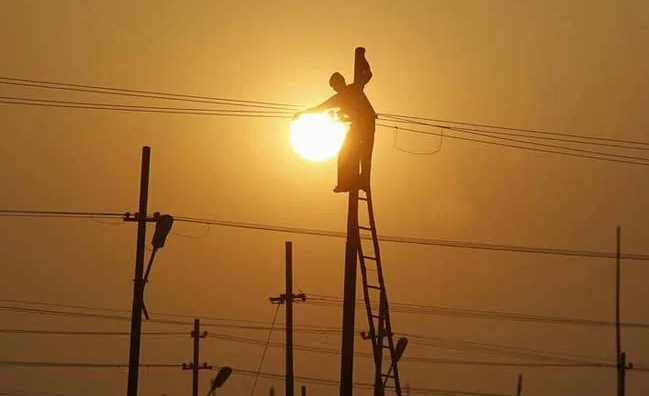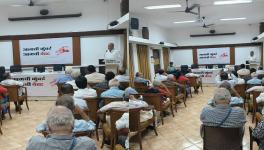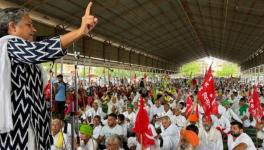Power Engineers, Farmers Hint at Nationwide Protests Against Electricity Law Amendment

Image Courtesy: NDTV
Tensions are expected to rise between the power employees and farmers in the country on one side and the Centre on the other, as the latter is likely to push for the passage of a controversial amendment to the Electricity Act of 2003 in the upcoming monsoon session.
Around 27 lakh electricity employees and engineers across the country will be forced to resort to a nationwide strike in protest against the move, one national body representing the power staff has suggested, even as the group representing the nation's farmers, accusing the Centre of going back on its promises, has already given a call to protest in 500 districts.
The Electricity (Amendment) Bill, 2021, aimed at de-licensing the power distribution business in the country, is likely to be introduced in the monsoon session, scheduled to begin on July 18, Union power minister RK Singh had suggested while addressing a program organised by FICCI last month.
"We (power ministry) should be able to take it forward to the Parliament in the monsoon session," Singh was quoted then as saying by The Economic Times.
The power engineers in the country strongly oppose the statement by Singh regarding the passage of the contentious amendment to the Electricity Act, All India Power Engineers Federation (AIPEF) said in a statement on Sunday.
It "should not be introduced in [the] monsoon session of Parliament in haste and should be discussed in detail with all the stakeholders, especially the electricity consumers and electricity workers," the national body added.
AIPEF further said on Sunday that it had sent a letter to Singh demanding the same and has also written to the chief ministers of all the states and Union territories, urging them to take effective intervention to stop this Amendment Bill of far-reaching consequences.
Shailendra Dubey, chairman, AIPEF, said on Sunday that in a national meeting to be held in Delhi in July, the body will decide on a "nationwide movement." The body had suggested last month that the "power workers across the country would be forced to go on strike."
Expressing disappointment against the Centre and accusing the latter of completely reneging on the written promises made to the farmers, the Samyukta Kisan Morcha (SKM), which spearheaded the farmers' movement last year, had earlier this month given a call to organise a "Protest Against Betrayal" in 500 districts in the country – beginning from July 18.
The national campaign will conclude with a countrywide chakka jam (road blockade) protest on all highways from 11 am to 3 pm on July 31, the collective of over 40 farmers' organisations had added.
Hannan Mollah, national general secretary, All India Kisan Sabha (AIKS), on Monday told NewsClick that farmers would be pressing the Centre to not introduce the amendment to Electricity Act, along with demanding the formation of a committee on minimum support price (MSP) and withdrawal of cases against the farmers.
According to an agreement reached between SKM and the Centre in December last year after the nationwide protests against agriculture reforms were called off following the withdrawal of the three farm laws, one of the consensus points was that the government would discuss the Electricity (Amendment) Bill 2021 with farmers before it is tabled in Parliament.
Mollah on Monday confirmed to NewsClick that neither the amendment to the electricity law has yet been discussed by the Centre with SKM, nor has the latter received an invitation for discussions as yet.
This is, however, at odds with an assertion made by Singh, who claimed at FICCI's event last month that everybody (all ministers and stakeholders) is on board for the amendment to the electricity law, according to the report by The Economic Times.
NewsClick has earlier reported on how the proposed amendment to the Electricity Act of 2003 pushes for a privatisation model in the power distribution business in the country while limiting the powers of state governments and local administrations – all purportedly to benefit the private corporations.
"Government corporations of electricity have set up a network of transmission and distribution of electricity by spending billions of trillions of rupees, and on its maintenance, government corporations are spending crores of rupees/month. Through this bill, private houses are allowed to use this network to earn a profit. This is the intention of the government in pushing this amendment bill," Dubey of AIPEF said on Sunday in a statement.
As far as it is concerned that this will give a choice to the consumers, "it is completely wrong," AIPEF further remarked, adding that it is clearly written in the proposed Bill that Universal Power Supply Obligation will be of government discoms (distribution companies) only.
"Private sector power companies will simply use the government network to provide electricity only to profitable industrial and commercial consumers. In this way, the work of providing electricity to the loss-making domestic consumers and the consumers of rural areas will, by default, be with the government electricity distribution company only. Due to this, the public sector power distribution companies will become financially poor, and they will not even have the necessary funds to buy electricity."
Likewise, Mollah of AIKS also on Monday told NewsClick that the de-licensing of discoms will be "destructive for the agriculture sector" in the country.
"Prices of petrol and diesel are already sky-high. In these times, the farmers will be further pushed to penury in case the proposed amendment to the electricity law is passed," he said.
Meanwhile, earlier last month, the People's Commission on Public Sector and Services (PCPSS), in a press statement, also expressed concern over the proposed amendment to the electricity law, claiming it is an "assault" on the federal structure of the Constitution.
"Electricity" is a concurrent subject and both Central & state governments have powers to make laws on this subject. But the proposed amendments to the Electricity Act substantially usurp the powers of the state and concentrate them with the Central government and its agencies," PCPSS, a coming together of academicians, industry experts and former bureaucrats, has said in its statement.
Get the latest reports & analysis with people's perspective on Protests, movements & deep analytical videos, discussions of the current affairs in your Telegram app. Subscribe to NewsClick's Telegram channel & get Real-Time updates on stories, as they get published on our website.
























